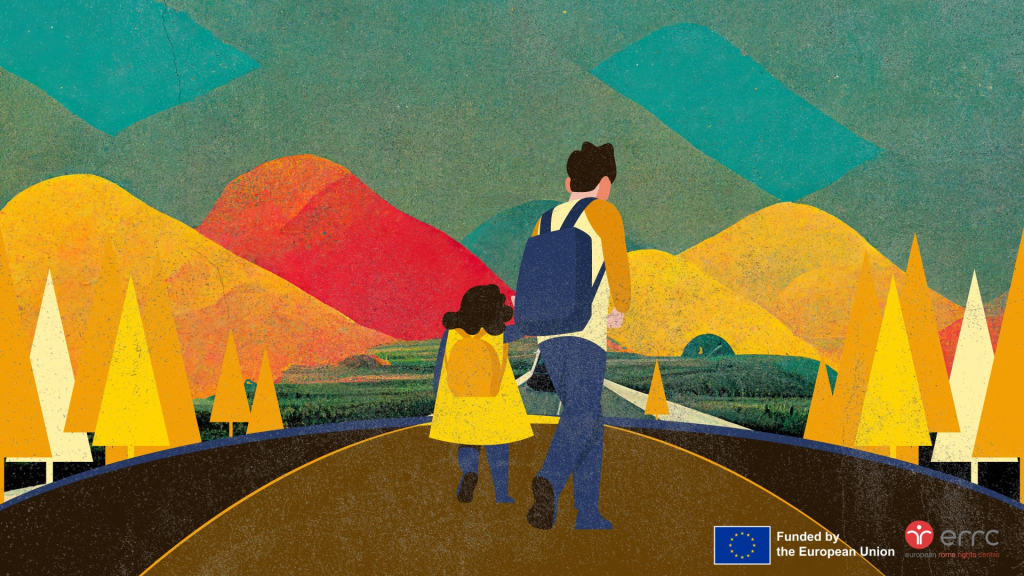ERRC Takes Legal Action for Romani Children Forced to Walk 7km to School in Tiszavasvári, Hungary
11 April 2024

Brussels, Budapest, 11 April 2024: The European Roma Rights Centre (ERRC) and the National Association of Disadvantaged Families have taken legal action to raise serious concerns about equal access to education and the safety of Romani children from the Bűd district of Tiszavasvári who are forced to walk around seven kilometres to reach their local school after their bus service was stopped. The complaint has been submitted against the Municipality of Tiszavasvári and the Educational District Centre of Nyíregyháza before the Deputy Commissioner for Fundamental Rights, Ombudsman for the Rights of National Minorities in Hungary.
“Bűd district is an ethnically segregated area predominantly inhabited by Romani people” said the ERRC’s Legal Director, Vivien Brassói. “Their financial situation makes it unrealistic for them to contribute to the proposed scheme to pay for the bus’s maintenance, or to transport their children to school by car. This is a clear example of how the unwillingness of local authorities and lack of resources and support disproportionately affect Roma.”
In the 2000s, the Chance for Children Foundation (CFCF) initiated legal proceedings against the Tiszavasvári Municipality before the Equal Treatment Authority (ETA) due to illegal segregation affecting the municipally maintained primary schools. Despite a 2012 ruling by the ETA ordering an end to educational and racial segregation, significant progress was only made in 2017 when the school district started phasing out teaching and transferring students and eventually closed the segregated school in 2022.
The closure of the school meant the bus service which had been established in 2013 and made free in 2017 to facilitate access to education for Romani children from the Bűd district, was also terminated. This forced the Romani children, even first graders, to walk or cycle nearly six to seven kilometres daily to school regardless of weather conditions. This frequently causes illnesses amongst the children, significantly impacting their health, safety, and equal access to education. In addition, parents, mainly Romani women taking their children to school, often need to carry their younger children in strollers and cover double the distance, which is time-consuming and hinders their ability to work.
On 23 January 2024, the severity of the problem led a group of parents to organise a demonstration in front of the town hall and meet the mayor, Zoltán Szőke, who stated that organising a school bus service is the task of the school district. The complaint before the Deputy Commissioner for Fundamental Rights, Ombudsman for the Rights of National Minorities argues that according to the relevant law this is not true. School buildings are still owned by the municipalities, not the school districts. Therefore, it is a municipal task to provide local public transport and ensure that students living in the Bűd district have access to education under the same conditions as their peers living in other parts of the city.
The mayor also stated that if the municipality's budget allowed, they would buy a smaller bus for this purpose, but they could only operate it if the parents buy a pass and contribute to its maintenance. Something which is unrealistic for large numbers of Romani families in the district who are severely socio-economically marginalised.
The Municipality of Tiszavasvári and the Educational District Centre of Nyíregyháza's failure to provide the necessary conditions for the children to attend school violates their fundamental rights. The ERRC strongly urges all responsible parties to find a solution that ensures equal access to education for all children in the community.
This press release is also available in Hungarian.
For more information or to arrange an interview, contact:
Jonathan Lee
Advocacy & Communications Director
European Roma Rights Centre
jonathan.lee@errc.org
+32 49 288 7679
Vivien Brassói (in Hungarian)
Legal Director
European Roma Rights Centre
vivien.brassoi@errc.org
+36 30 225 7568
 |




